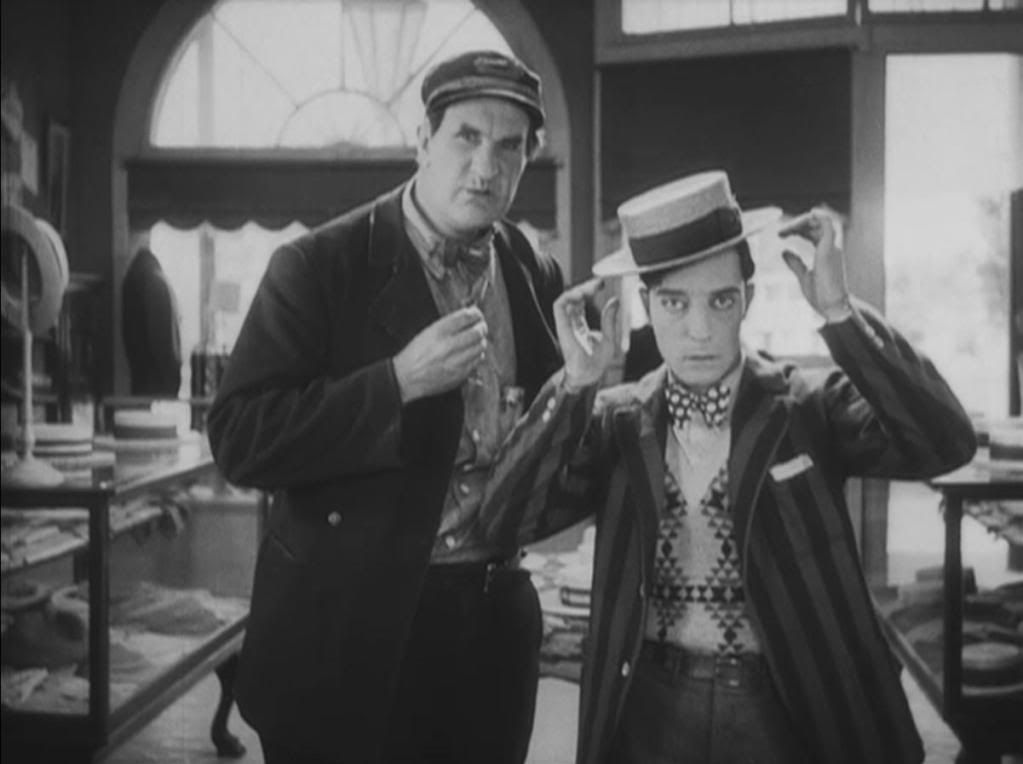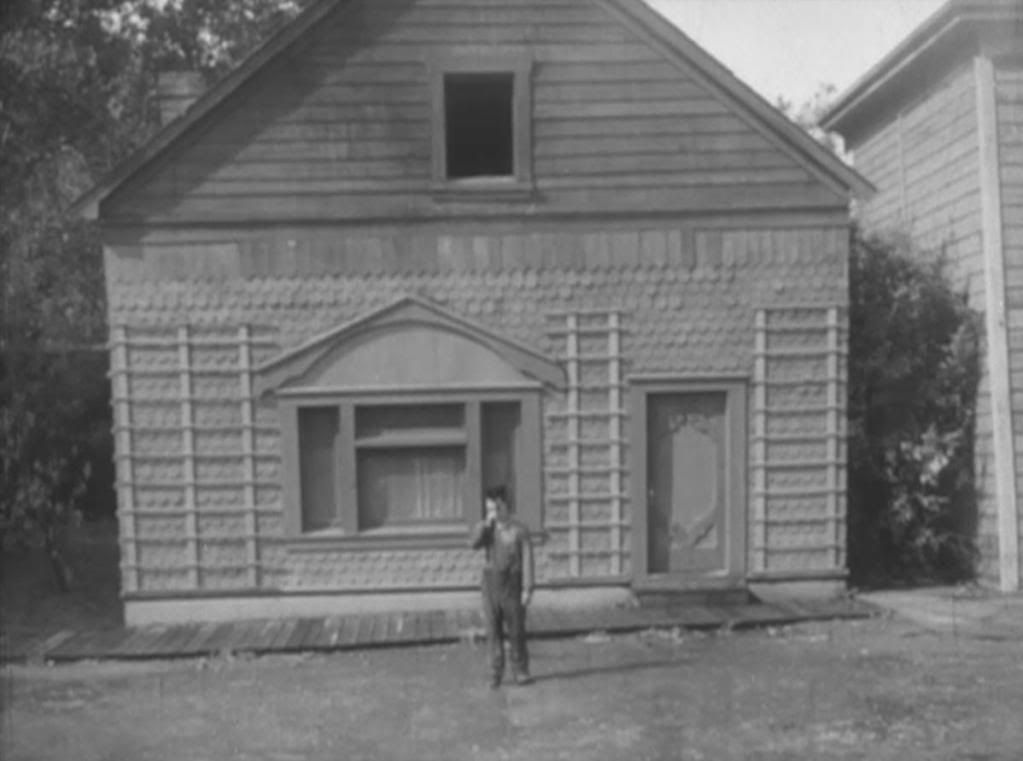
Steamboat Bill, Jr. is another of Buster Keaton's absolute best films, a brilliant masterpiece of physical comedy with a premise perfectly tailored to Keaton's penchant for death-defying stunts, blending humor and action to such a degree that those two aspects of his work become inextricable. Keaton's physical feats of daring at the climax of this film represent some of his best stuntwork, both irresistibly funny and shocking in the very real sense of danger that's continually present in these obviously carefully timed and designed stunts, where just a second or an inch off could've meant disaster for the actor. It's obviously Keaton's very precise, utterly logical genius driving these stunts and gags, which is why it makes no difference that he's not the credited director; it's Keaton's unmistakeable intelligence at work here, not that of credited director Charles Reisner.
The film has a quite poignant thematic emphasis on fathers and sons, as Keaton plays an effete, intellectual college kid who tries to impress his tough, masculine riverboat captain father Steamboat Bill (Ernest Torrence), who he is meeting for the first time. When Bill first realizes that Keaton is his son, Keaton is prancing around with a violin in a manner that's obviously meant to be a parody of homosexuality — he's trying to quiet a crying baby with his antics, but his father doesn't realize this and simply looks at this spectacle as the first manifestation of his son's unmanly ways. In his beret and fancy clothes, with a wispy mustache that earns the withering contempt of his father, Keaton recalls the inept snobs of some of his earlier films, though here he's not a son of privilege. The subtext is Bill's desire that his son — even a son that he hasn't seen since he was a baby — should be an echo and a mirror of the father, hence the comedy of the scene in which the captain walks around the train station trying to figure out which man is his son. At one point, he mistakenly walks up to a black man in a gag that recalls Keaton's mistaken proposal to a black woman in Seven Chances, both jokes essentially reflecting some skittishness and subtextual discomfort with the prospect of inter-racial romances.
The heart of the film is this troubled father/son dynamic, with the father disappointed in the son he'd hoped would be a rugged tough guy like his dad, and the son who just wants to impress his dad without having to discard his entire persona. Keaton fits in better, it seems, with his father's rival, J.J. King (Tom McGuire), who runs a much more modern and fancy steamboat operation, and whose daughter Kitty (Marion Byron) is Keaton's girlfriend, much to the chagrin of both the rival fathers. This Romeo and Juliet tale of forbidden romance provides the impetus for some of the best jokes, as Keaton keeps trying to sneak away to see Kitty under the watchful and disapproving eyes of both fathers. There are countless inventive and funny sequences here, particularly an extended bit of Keaton keeping various clothes hidden under his bedrobe so he can sneak out. Byron's also a dynamic, adorable presence here, one of Keaton's best leading ladies, her cutesy energy and almost Chaplin-esque shuffling walk a nice contrast to Keaton's infamous stoicism and restraint.

Keaton has a way of enlivening even minor scenes with subtle little gestural touches, like the way he discreetly leans in to smell Kitty's hair while she's talking to him, or the way, after he's knocked out by the sheriff and thrown into the back of a car, with only his legs sticking up, he casually crosses his legs as the car takes his supposedly unconscious body to the hospital. Also hilarious is the scene where he tries to bust his father out of prison with some tools baked into a massive loaf of bread, a scene in which Keaton's whimsically pantomimes various hand signals for escape to his father while the sheriff's back is turned.
The peak of the film, though, is unquestionably the lengthy climax, one of the best of Keaton's typically frenzied final act extravaganzas, as a storm sweeps through the town, with Keaton wandering dazed and baffled through one dangerous situation after another. This whole sequence is a marvel of split-second timing and perfectly realized stunts, with whole buildings and houses falling down or blowing away with Keaton right next to them, the town being torn apart all around him, with him as the mostly untouched center of the storm, always just in the right spot to avoid otherwise certain death. Most famously, at one point the whole front wall of a house falls down and Keaton survives because he's standing precisely in the spot where the window lands. There are countless more similarly startling moments, like a house that lands on top of him and then collapses as soon as he steps out of its door, or a wall that falls as he steps through its door. At one point, he wanders onto a theatrical stage, where he pulls a chain that causes him to disappear into a trapdoor. He then tries to dive into a lake that turns out to be a painted backdrop, a realist echo of the magical dream at the center of Sherlock Jr.; the theater isn't as permeable to magical intrusions as the cinema's screen.
As these incidents pile up and the wind blows, Keaton's unceasing physical artistry becomes absolutely hypnotic, especially during the daring chain of rescues that caps off the film, with Keaton athletically leaping from one level to another on the steamboat and rigging a series of mechanical contrivances of the kind he's always loved. His bravado wins over everyone — his father, Kitty's father, and Kitty herself — so that his character wins the admiration he so intensely desires even as Keaton himself wins the admiration of any audience witnessing the very real stunts and gags he executes so flawlessly here.
No comments:
Post a Comment